Complete Solutions to SECTION - II of chapter SAMPLE PAPER 2019 of Class 10 book with complete answers and questions
| Class 10 | PHYSICS |
| Chapter | SAMPLE PAPER 2019 |
| GURUKUL | SECTION - II |
| Number Of Questions | 33 |
| Academic Year | 2023-24 |
A body of mass 10 kg is kept at a height of 5 m. It is allowed to fall and reach the ground.
What is the total mechanical energy possessed by the body at the height of 2 m assuming it is a frictionless medium ?02:08View SolutionA body of mass 10 kg is kept at a height of 5 m. It is allowed to fall and reach the ground.
What is the kinetic energy possessed by the body just before hitting the ground? (Take g = `10m//s^(2)`).02:30View SolutionA uniform meter scale is in equilibrium as shown in the diagram : Calculate the weight of the meter scale.
(ii) Which of the following options is correct to keep the ruler in equilibrium when 40 gf wt is shifted to 0 cm mark?
F is shifted towards 0 cm.
Or
F is shifted towards 100 cm.04:14View SolutionThe diagram below shows a pulley arrangemnet :
(i) Copy the diagram and mark the direction of tension on each strand of the string.
(ii) What is the velocity ratio of the arrangement ?
(iii) If the tension acting on the string is T, then what is the relationship between T and effort E ?
(iv) If the free end of the string moves through a distance x, find the distance by which the load is raised.03:00View SolutionHow does the angle of deviation formed by a prism change with the increase in the angle of incidence ?
Draw a graph showing the variation in the angle of deviation with the angle of incidence at a prism surface.02:35View SolutionA virtual, diminished image is formed when an object is placed between the optical centre and the principal focus of a lens.
Name the type of lens which forms the above image.02:25View SolutionA virtual, diminished image is formed when an object is placed between the optical centre and the principal focus of a lens.
Draw a ray diagram to show the formation of the image with the above stated characteristics.02:23View SolutionAn object is placed at a distance 24 cm in front of a convex lens of focal length 8 cm.
(i) What is the nature of the image so formed ?
(ii) Calculate the distance of the image from the lens.
(iii) Calculate the magnification of the image.02:31View SolutionIt is observed that during march-past we hear a base drum distinctly from a distance compared to the side drums.
Name the characteristics of sound associated with the above observation.01:36View SolutionIt is observed that the temperature of the surroundings starts falling when the ice in a frozen lake starts melting. Give a reason for the observation.
02:28View SolutionA pendulum has a frequency of 4 vibrations per second. An observer starts the pendulum and fires a gun simultaneously. He hears the echo from the cliff after 6 vibrations of the pendulum. If the velocity of sound in air is 340 m/s, find the distance between the cliff and the observer.
02:18View SolutionTwo pendulums C and D suspended from a wire as shown in the figure given below. Pendulum C is made to oscillate by displacing it from its mean position. It is seen that D also starts oscillating.
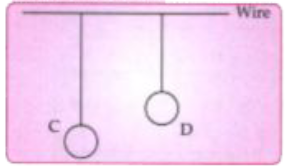
(i) Name the type of oscillation, C will execute.
(ii) Name the type of oscillation, D will execute.
(iii) If the length of D is made equal to C then what difference will you notice in the oscillations of D?
(iv) What is the name of the phenomenon when the length of D is made equal to C?05:34View SolutionWrite one advantage of connecting electrical appliances in parallel combination.
03:17View SolutionWhat characteristics should a fuse wire have?
01:18View SolutionWhich wire in a power circuit is connected to the metallic body of the appliance ?
00:58View SolutionThe diagram below shows a dual control switch circuit connected to a bulb.
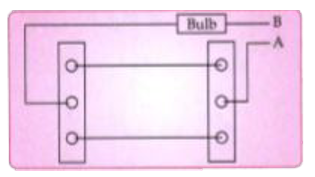
Copy the diagram and complete it so that the bulb is switched ON.01:49View SolutionThe diagram below shows a dual control switch circuit connected to a bulb.
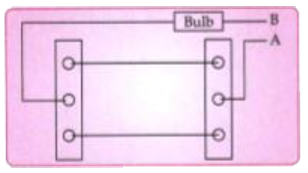
Out of A and B which one is the live wire and which one is the neutral wire ?01:39View SolutionThe diagram alongside shows a circuit with the key k open. Calculate :
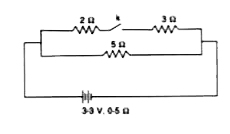
the resistance of the circuit when the key k is open.01:09View SolutionThe diagram alongside shows a circuit with the key k open. Calculate :
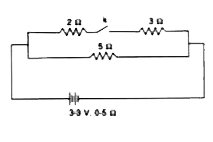
the current drawn from the cell when the key k is open.01:26View Solution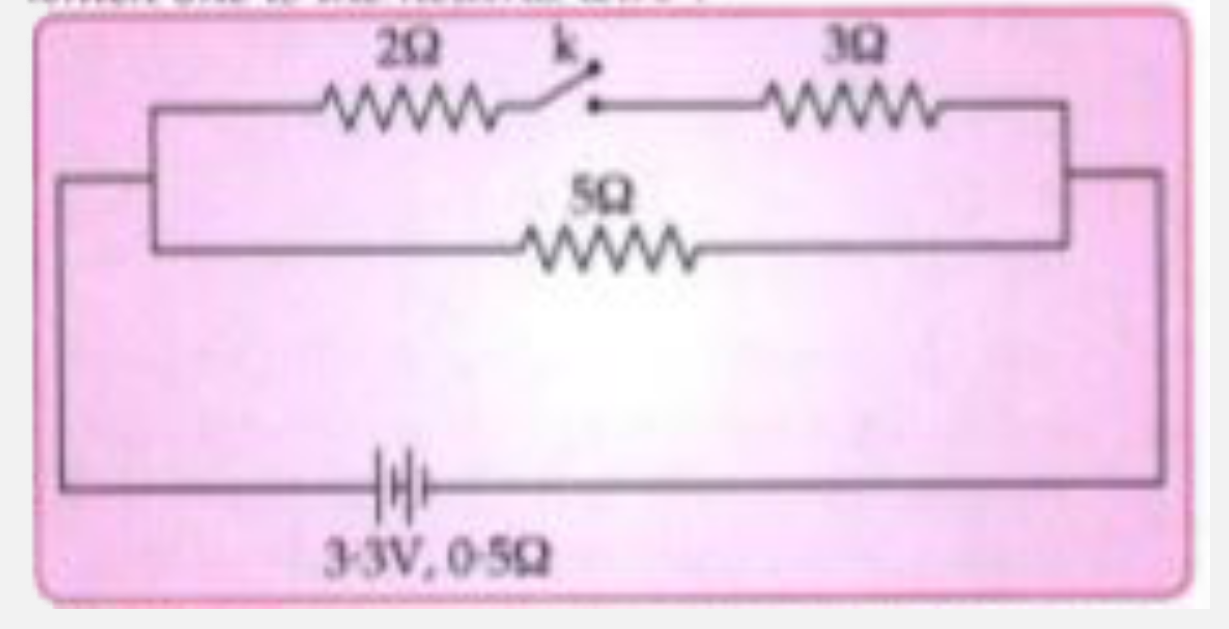
The diagram above shows a circuit with the key k open. Calculate :
the resistance of the circuit when the key k is closed.03:10View Solution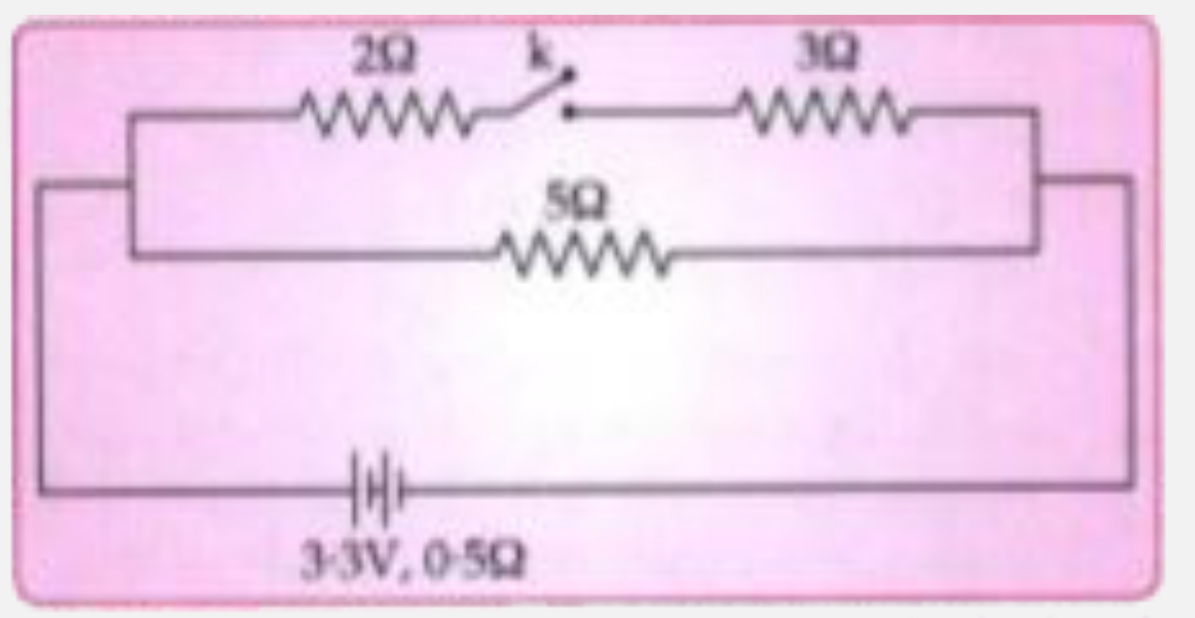
The diagram above shows a circuit with the key k open. Calculate :
the current drawn from the cell when the key k is closed.03:39View SolutionDefine Calorimetry.
02:01View SolutionName the material used for making a Calorimeter.
01:01View SolutionWhy is a Calorimeter made up of thin sheets of the above material.
02:23View SolutionThe melting point of naphthalene is `80^(@)C` and the room temperature is `30^(@)C`. A sample of liquid naphthalene at `100^(@)C` is cooled down to the room temperature. Draw a temperature time graph to represent this cooling. In the graph, mark the region which corresponds to the freezing process.
02:28View Solution104 g of water at `30^@`C is taken in a calorimeter made of copper of mass 42 g. When a certain mass of ice at 0°C is added to it, the final steady temperature of the mixture after the ice has melted, was found to be `10^@`C. Find the mass of ice added. [Specific heat capacity of water = 4.2 J `g^(-1)""^@ C^(-1)`, Specific latent heat of fusion of ice = 336 J `g^(-1)`, Specific heat capacity of copper `= 0.4 Jg^(-1) ""^@ C^(-1)`].
03:26View SolutionDraw a neat labelled diagram of an A.C. generator.
02:57View SolutionDefine nuclear fission.
01:19View SolutionRewrite and complete the following nuclear reaction by filling in the atomic number of Ba and mass number of Kr :
`""_(92)^(235)U+""_(0)^(1)nto""_(...)^(144)Ba+""_(36)^(...)Kr+3""_(0)^(1)n+"Energy"`03:34View SolutionThe diagram below shows a magnetic needle kept just below the conductor AB which is kept in North South direction.
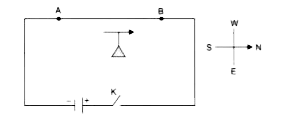
In which direction will the needle deflect when the key is closed ?01:02View SolutionThe diagram below shows a magnetic needle kept just below the conductor AB which is kept in North South direction.
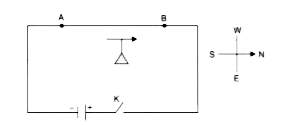
Why is the deflection produced ?00:42View SolutionThe diagram below shows a magnetic needle kept just below the conductor AB which is kept in North South direction.
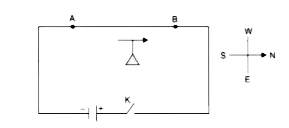
What will be the change in the deflection of the magnetic needle is taken just above the conductor AB ?01:01View SolutionThe diagram below shows a magnetic needle kept just below the conductor AB which is kept in North South direction.
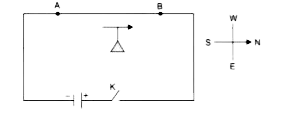
Name one device which works on this principle.01:19View Solution
SECTION - II questions and complete solutions for chapter SAMPLE PAPER 2019 of SELINA PHYSICS (ENGLISH) of Class 10
